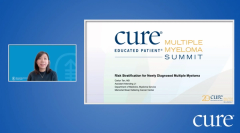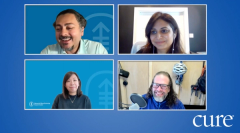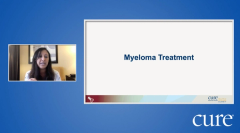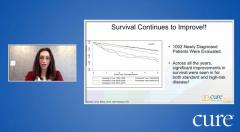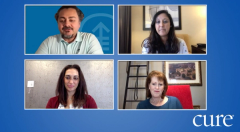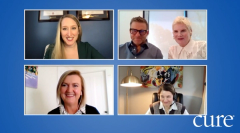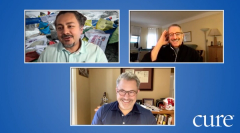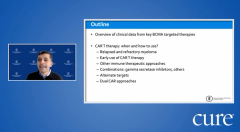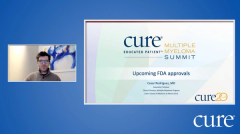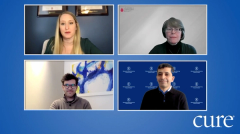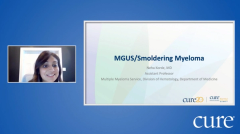
Educated Patient® Multiple Myeloma Summit Myeloma Treating Myeloma Long-Term Panel: March 12, 2022
Watch Kristie L. Kahl, Donna and Jack McNutt, Dr. Noopur Raje, and Grace Allison, discuss treating myeloma long term, during the CURE Educated Patient Multiple Myeloma Summit.
This panel featured Kristie L. Kahl, Donna and Jack McNutt, Dr. Noopur Raje and Grace Allison.
Kahl: First, Donna, we're going to start with you. Can you just briefly tell us about your journey with myeloma and what it's been like to hit your treatment milestones throughout this journey?
Donna McNutt: In 2015, I was diagnosed in the last stage of multiple myeloma with failing kidneys. I had a stem cell transplant at City of Hope, have never been out of treatment. I think I've been on every type of treatment. And last October, I was given the opportunity to have CAR T therapy. I sit before you today, seven years, after, you know, a rather traumatic beginning of my journey, to give hope to other patients that I'm here. There has been so many wonderful new treatments available to me. And I've done wonderful after CAR T, and the first time in seven years I am completely off treatment since October.
Kahl: And then Jack, can you discuss your role as Donna’s caregiver and what that journey has been like for you?
Jack McNutt: You know, it's been by her side 100%, you know, going to every appointment, doing a deep dive into all aspects of myeloma, the treatments. You know, the test results, what do they mean? And really just being there, and positive and keeping a positive outlook. And I sort of had that from day one when we connected with City of Hope and Dr. Krishna and I knew we were in the right place. And from that point, I'm like, look, let's keep moving one day at a time, one week, one month, let's not become pessimistic. There is no expiration date for you, honey, it's Let's go. And there's so many studies being done and research and tests and trials that new treatments are going to emerge every month, every year. Let's keep going. And, you know, case in point the CAR-T cell infusion that Donna had, which is remarkable. So there you have it.
Kahl: Absolutely, thank you. And Dr. Raje, we just heard about Donna's treatment journey. So can you discuss how we're treating myeloma long term, more as like a chronic disease, for example, nowadays? And how do we decide on a patient's treatment plan?
Raje: Yeah, those are great questions, Kristie. And first of all, Donna, I'm so happy that you're doing as well as you are and that you had access to CAR T cells. And you know, I can't say enough about what you do for Donna, Jack, because it is a journey, which we're going to do together. And you know, we appreciate it. Donna is actually going through the whole process physically, but Jack is going through it sort of physically and emotionally. So it's fantastic that you're trying to help other patients who are going through this whole process.
And I think it's really important to remember every patient with multiple myeloma is different. And it's really important that we try and cater to what is going on with that specific patient. As you highlighted Donna, when you first presented you had kidney related issues. And when you have those, there are certain drugs that we can and cannot use, or we dose adjust them. But really what we are able to do in 2022, is look at myeloma in the long term, try and come up with treatment strategies, so that you have all your options available to you. And the important thing to remember is myeloma can relapse. And when I start talking to my patients, I will always tell them is whatever we do right now we're going to make sure that we're not going to be burning any bridges down the road so that you're going to have access to drugs which come along the way. And what we're doing right now is combination approaches, We're starting off with combinations to begin with, and then dose adjusting them depending on how you tolerate them. And typically, we'll keep readjusting based on when the disease comes back.
Kahl: Okay, and so then Grace, with so many options now, can you discuss how nurses play a role in the treatment continuum – from diagnosis and beyond?
Allison: Sure, I think that it's important, as we've been hearing all along that an educated patient is able to make better choices in terms of their health care, we want to be able to provide information on how to manage side effects, if they're on a maintenance drug that's causing difficulty, how do we handle the chronic side effects that can be a part of that, like peripheral neuropathy or GI upset. So, helping them manage them, getting strategies for that. And then just kind of transitioning into a survivorship type of mode, letting them know, like the other physician said, this is a chronic condition that we can live with. And so, addressing those survivorship issues, such as, you know, long-term care and possibly other health issues.
Kahl: Dr. Raje, now that we have various options, why is treating with the most effective treatment first recommended now?
Raje: So, I think it's really important to not save the best for the last, right? You’ve got to try and use your best drugs up front. We have lots of new drugs which are available to us. And the other important thing to remember is, as we're progressing through the journey of myeloma, how we approach myeloma keeps changing. So a couple of years back, we used three-drug combinations. Today, I would use a four-drug combination. And it's critical to try and get a patient into remission, as deep a remission as possible. If you can get to that MRD-negative disease, you need to do that. Because the deeper your response, the more delayed your disease coming back will be. And with the kind of progress we are making in the research world, every year you've seen this, we have new drug approvals, new cell therapy approvals. Just last week (in early March 2022), we had another CAR-T cell approval as well. So, I think making sure that your initial treatment is your best treatment available. And as Jack pointed out, we're going to have more and bigger and better drugs going down the road. So as long as we can keep you well, that should be the goal, and not just try and use the mentality of “I'm going to save this for when the disease comes back.” The one thing I will say is when we're using the drug combinations, on an average, the disease doesn't come back for four or five years now. And that is remarkable. And that's a little bit of a shift from what was happening early on.
Kahl: Donna, I want to throw it back to you. Looking back to your pre-cancer diagnosis, what is one thing you wish you knew about having an active voice in your journey that you know now?
Donna McNutt: Well, I think for me, the biggest thing, if I could go back before, I was really sure that I knew going into my multiple myeloma that I needed to get a second opinion. And as you've all discussed today, I meet a lot of patients who are staying local, and I just really promote for them to find a specialist in their cancer. I think what I would tell other patients from the beginning of my journey is that you'll find your footing. It's a lot in the beginning. You start comparing yourself. There's a lot, even on these forums, (of instances) that you think, “Oh, I'm not doing that. I am not part of this.” If I could tell myself, you'll find what you need.
You'll need someone. You know, my husband is better with the medical stuff. Sometimes I'm sitting at an appointment and it's like Charlie Brown's teacher is speaking. Nowhere in my mind before cancer was I reading medical books. That is not my forte. So I rely on my husband.
I also have a group of multiple myeloma patients (that support me). (We all know) cancer doesn't discriminate. So I have a really wonderful group that (is different). (We) have a pharmaceutical representative, I have a professor. I might be the shoe expert. We all are different. So I go to them, too.
And I think that's what I would assure a patient. You'll find your footing. You'll find what works for you. And the combination I have in my life now, it works for me. I think that's what I would tell myself, you're going to find the right way to be on this path. And don't be hard on yourself.
Kahl: Jack, Donna just mentioned how integral you were in going to her appointments and helping her understand the medical side of things. So, from a caregiver perspective, why is it important for your voice to also be heard through this journey?
Jack McNutt: Well, because I'm right along with her and I'm seeing it, I'm seeing the side effects that she has, the hope or the doubt that she goes through. So I can provide that second voice to say, “Hey, wait a minute…” So it's not just coming from her. It's coming from somebody who's watching her very closely.
Donna McNutt: I really think, Kristie, that anytime I'm doing these forums, and I'm so lucky that I do have a husband and a partner, but I do meet a lot of patients who have to go through this on their own. And I just want to let them know if they're part of this, that you find a group at your hospital, you reach out. A lot of us are partners for each other. Even if you were to take notes at your doctor's office, go to another patient and find someone. Because this looks perfect, and I really have a heart because I've met so many patients that say, “I don't want things to be that way.” When you're watching something and you're thinking, “Oh, I don't even have a partner like that.” And, you'll find that, even if you're close to your oncology nurse, or discuss (it with them), take lots of notes, find another multiple myeloma friend. Go on these really great forums that we're seeing today. And let that be your partner. Sometimes those are just as good.
Kahl: That's great advice. Grace, Donna just put it great, because not everybody does have that support. So, do you have recommendations or resources that you can share with our audience to share their story and meet others with myeloma?
Allison: Absolutely, just absolutely. Following on what Donna has said, my role is a patient navigator at the Multiple Myeloma Research Foundation. And so we are a group of patient navigators who can be available by email or at the end of the telephone. If patients have questions from initial diagnosis on, and at any point in that myeloma journey, we're there to be a sounding board to be objective, to empower that patient to be able to advocate for themselves to get the care that they need. So, (talk to) navigators and, as Donna mentioned, support groups. I think when you are initially diagnosed, it's such a new and foreign world, (so you need) to find your group, to find a support group.
We do have, on our website, a function where you can search, by just putting your zip code, and find a support group in your area. Most of them are virtual right now. So that's even better. You can choose one that fits you. We have mentors available, myeloma mentors, who are specially trained. Myeloma patients walk that path and are available to connect with patients, again, at any point to offer that support so that people do not feel alone and to just help provide that support. So those are some of the resources.
Kahl: We have some time left, if the audience has any questions, just be sure to type them into the box on the right hand side. We did have one come in. Donna, can you confirm your kidneys are recovered, and if so, when?
Donna McNutt: I will always have damage to my kidneys as I haven't had any major difficulties, but once you have had the kind of damage that I had to my kidneys, that's the part of my labs that I'm looking at too. So, I've had little spikes sometimes and like the doctor said, we'll pull back on certain treatments. I want you to know that if you have started out your journey like that, they do get better. And I am very cautious about that.
Kahl: So I want to go back to the treatment aspect of it, too. So, Dr. Raje, I'd mentioned earlier to Grace about the nurse’s role, but can you discuss how this is more of a multidisciplinary disciplinary approach now, and why it's so essential for a larger care team to be taking care of patients with myeloma?
Raje: Absolutely, Kristie. Just to piggyback on what Donna, Grace and Jack have said, this is a journey where you're not alone. You have your whole care team behind you. So, you have your nurses, your nurse practitioners, working with your physician, and you do have the support group systems.
One thing I do want to highlight, it's really important, and I think you brought this up Donna, to have an expert opinion. And I cannot underscore that enough. And the reason for that is there's so much evolution in the advances in myeloma. Somebody who is at the forefront of this is going to be critical in helping with your care. And we do this all the time. So it's not as if I treat all my patients at Mass General. I work very closely with the community oncologists, and they actually appreciate our help. So that's the one part when it comes to the care for myeloma.
But as you all know, and Donna, you brought this up, you did have kidney damage when you first presented, having somebody from the renal team on your case is critically important. Like you said, most patients will recover their kidneys if they're treated appropriately and aggressively. The other problem, which our patients commonly will have, is bone-related problems. And with those bone related problems, you can have significant complications, you can have fractures, pain, you can end up sometimes with neurological problems. So having the orthopedic surgeons in close contact when you need procedures, such as kyphoplasties
and vertebroplasty, we have access for that pain control. So it's a bunch of different doctors who play into taking care of myeloma, because myeloma can be a little more complicated. So having access to all of those approaches is important. And discussing those, depending on how your myeloma is behaving, is important as well.
Kahl: Absolutely. And so, we've talked about the multidisciplinary approach and making sure you're seeing a myeloma specialist. Donna and Jack, can you also talk more about the communication and how that's key with these teams, because, you know, you can find the right doctors, but to be an active voice in your long-term care is also really important?
Donna McNutt: Well, I think it's really important No. 1, to understand what is on your labs, even if it's a few points on those, you educate yourself. So when you go in, you're asking what are my light chains. I understand what those are. These are the things I need to look at. So for me, it is the light chains and certain things. Educate yourself on what your labs are. I think that's really important.
If you have a portal, try to see if some things are up before you walk in your doctor's office, (take) notes down that you're going to go through with your doctor, to use your voice at your doctor's. I think sometimes we are a little intimidated, you know, when people are just so brilliant in front of us. And I've learned that to speak up and be a part of my care. At the same time, it's so important to trust your doctor, but I think if you learn to understand your labs, and to take notes, and if you don't get that answer, even ask, Grace, your oncology nurses. I can't thank you all enough. I mean, the doctor gives us information and ee go right to our oncology nurse and asked her to define it foe us. They get us for hours. My doctor gets paid for 10 minutes. So, ask your oncology nurse, “I didn't understand this.” Ask, ask, ask until you feel like you got that answer. It might not even be at that appointment, but go and ask someone else. Learn how to I read certain specific things on your labs.
Jack McNutt: For me, it's the one-on-one with the doctors, when we sit down with our doctor, and to be able to ask her and really drill down for me, that's where I get it. I’m not in any of the nurse discussions when Donna's having treatment. So it's those opportunities, which have been difficult with COVID. Honestly, COVID was rough, because I was not part of any of those for a year and a half. We didn't even Zoom. Donna would go in and have the one-on-one. So I'd get bits and pieces. So I really missed it. So I'm happy that I'm able to get back in and sit with our doctor and ask her the questions. And then (with) the CAR-T cell (therapy), all the questions, because I mean, my mind is like, “Okay, what is this? What is that?” So I could get a good understanding where we're going in a more macro sense.
Donna McNutt: Sometimes I'm picking him up, because he's asking too many questions.
Kahl: And then Grace, through the patient navigation, I'm sure you've talked to a lot of patients, and they have a ton of questions. So from your experience, what is your biggest piece of advice for our audience today, patients and caregivers alike?
Allison: I know we're going to all sound like a broken record, but we approach it with what we call the right track. And that is having the right team with you, getting the right tests and making sure you're on the right treatment. So that starts with having the right team, a specialist who deals with myeloma.
But then the questions that we get, I think, a lot of times, like Donna said, especially in the beginning stages, you hear something, and you have to hear it about five or six times before it really sinks in, and you get a good grasp on it. And then once you are spending more time with your physician, then you start to understand what they're communicating with you.
So just trying to empower patients to ask the questions, to come back and sort it out with us afterwards. “What was that again?” You know, to get a really good handle of what's going on. Then you can be very much a partner in your care. It's far from the days where a physician would come in, say, “This is what I'm going to do.” Now physicians are very much partners with the patients. Andit's a dialogue. And it's personalized. So that's just empowering the patients to know that if this is for you, we're there for you. And whatever it is that you need, we're trying to meet that need.
Kahl: So I just want to get some parting thoughts. So Dr. Raje, I think we have a lot to be hopeful for, it seems, after hearing all of our presentations here today. So do you have any parting thoughts for our patients and their caregivers on what we have to look forward to in the long-term care of this disease?
Raje: Yeah, this is a very exciting time, because we have all of these opportunities for our patients … things which I would have never imagined we could actually get to a patient. We are actually doing it. Donna's an example of one such treatment, which is for the first time, Donna, you've had your CAR-T cells and you're on no treatment for your myeloma. Most of our myeloma patients are so used to being on continuous therapy. So this is a paradigm shift.
And I think for the future, all of us as investigators, researchers, clinicians, are so excited about the potential of really talking about curing, certainly a significant proportion of patients with myeloma. And, you know, the higher-risk patients, obviously, we have to do a little more work. But we I think the good news is it's not just the treatment tools that we have available to us. We also have the tools wherein we are able to pick up disease earlier, we are able to see things like MRD status on patients, where we are able to find one in a million myeloma cells. So these are all advances and this is the first step towards actually long-term disease control, which in my mind is the first part of the definition of curing myeloma. So we're very excited about this.
Kahl: Grace, I'll throw the same question over to you. What do our patients have to look forward to?
Allison: So when I started out, it was a long time ago in Little Rock, Arkansas, and 30 years ago, it was a very different picture when people were diagnosed. So, like the doctor said that the opportunities are available, guiding people in the right direction, making sure they're aware of their opportunities, doing clinical trials. So being able to look forward to a balance of therapy and quality of life, always having that in mind, knowing that they're not going to be sick forever, they may be on therapy now. But there's going to be a time when they will have a policy and hopefully get into a remission phase, where they're not on specific therapy. We can help to give them some hope to move forward.
Kahl: So Jack, I'll throw it over to you. Through your experience, what do other caregivers have to look forward to as we move forward with this disease?
Jack McNutt: Well, again, it's hope in the medical world. I mean, we're so fortunate today, again, with so many advances and more to come and a cure, like we've been talking. I mean, it's out there, it feels like it's really out there. And as certain cancers are now curable, it feels like myeloma is getting in that. That's my feeling, getting in that direction. And the key is quality of life. And Donna's fortunate now that her not having the treatment, not having to keep on the steroids, her quality of life is through the roof. And it's a great place to be. And we're going to ride this CAR-T (cell therspy) as long as it'll work and who knows how long. So yeah, we just remain hopeful. And that's it. Hope is the key.
Kahl: And Donna, what are your thoughts on the future?
Donna McNutt: Literally was going to say hope. There is hope. I am an example of that. And I just want to thank you so much for inviting us on the summit. And to each one of you. You're all such an important part of our journey. And we hope that we can return the favor. And please, you know, reach out to your fellow multiple myeloma (patients). I've never met such an incredible group of humans, it's the one blessing that has occurred is I have not met a warrior yet that I've not been completely inspired by. And this whole thing is just one big circle. You know, we're all meeting somehow, connecting. And it's been incredible. And don't give up hope. Seven years and I still have that same hope. And I thank you all so much for letting us join you today.
Raw transcriptions have been lightly edited for clarity.
For more news on cancer updates, research and education, don’t forget to

